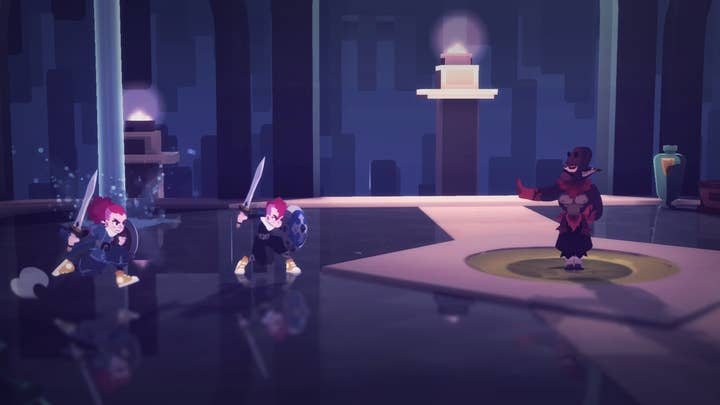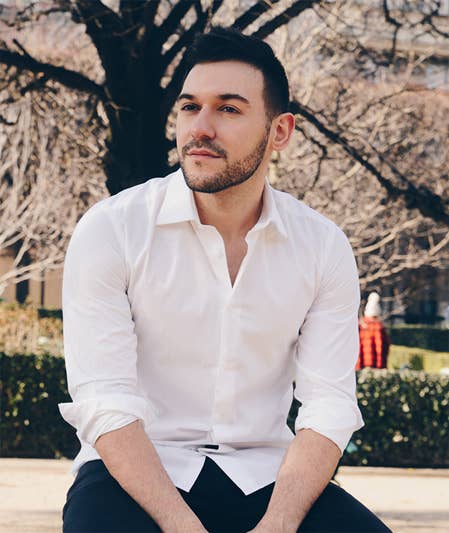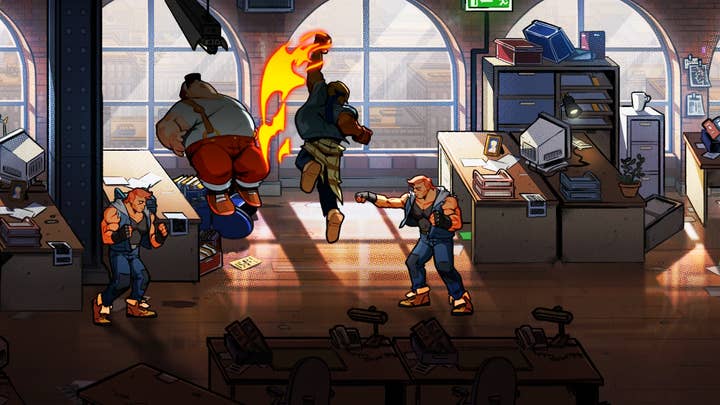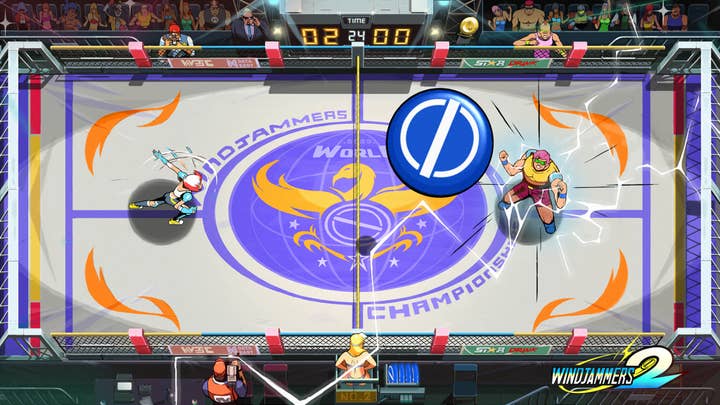Dotemu, The Arcade Crew, and the retro revival
CEO Cyrille Imbert and marketing head Arnaud De Sousa explain how the studio and its publishing label are bringing classic style to a new generation of fans and aspiring developers
If you only look at releases, it's been a quiet year for French development and publishing studio Dotemu. But for CEO Cyrille Imbert and head of marketing Arnaud De Sousa, it's been anything but.
Earlier this year, Dotemu announced it was putting together a new indie publishing label called The Arcade Crew with the aim of publishing original IP, rather than Dotemu's traditional focus on revitalizing existing retro IP.
The newest of those original IP, Young Souls, was shown off for the first time at PAX West earlier this year. Though still extremely early in its development, for De Sousa, Young Souls was an instant, obvious choice for the new publishing label.

"It wasn't really hard to fall in love with the game. We saw the first trailer they made and in five minutes, we were like, 'We want that game. We need that game. Everybody needs that game.' That was an easy pick.
"After talking with the devs, I saw that that feeling was right," De Sousa continued. "The dungeon crawler thing, beat-em-up. That's very classic. Another thing is when I saw the trailer, I felt that retro vibe, like a teen movie, from the '80s or '90s, like Stranger Things. Even though the game doesn't look retro, the storytelling looks really retro."
"Teenagers adventuring against monsters, no one knows except them, it really brought back memories from the Goonies, that kind of stuff," Imbert added. "The gameplay just felt right."
"Retro" is the whole focus of The Arcade Crew, but Young Souls admittedly doesn't look very retro at a glance. Instead, Imbert said it fulfills a different aspect of a portfolio that isn't all about looks.
Cyrille Imbert"We won't say, 'It doesn't look retro, so we won't take it'"
"We won't say, 'It doesn't look retro, so we won't take it,'" said Imbert. "It's more about the general atmosphere, the general spirit. Our criteria are that it has to be retro in some way, either by graphics, gameplay, references, just in some way. So we tried to pick projects that feel retro and right for The Arcade Crew."

Young Souls is still in pre-production, and The Arcade Crew is content to sit back and let developer 1P2P work their magic, with Imbert noting that "When they need us, they'll let us know." The Arcade Crew, as part of Dotemu, also includes a team of designers and developers with a history of stepping in to assist on projects as needed, and they're ready to do so should Young Souls need help, especially as its dungeon crawling and RPG mechanics progress.

But for now, The Arcade Crew has plenty more on its plate. Two other titles, Dark Devotion and Blazing Chrome, are set for and early 2019 release - each embodying a different aspect of what Imbert and De Sousa see as the "retro" vibe of The Arcade Crew's portfolio.
"We have three games that show various examples of what we want to do with retro-feeling games," said De Sousa. "The first one we showed, Blazing Chrome, is super retro in every way. Even the color palette is from the Genesis. After that, we announced Dark Devotion, which is kind of retro in graphics. But the gameplay is really modern. Then you have Young Souls which is retro in atmosphere, but visually it's really modern. So I think we have a good rainbow of stuff with The Arcade Crew."
Though the company has been busy getting word out about The Arcade Crew and securing the studios it will work with, the Dotemu side of the business hasn't been idle either. Alongside Young Souls at PAX West were two upcoming Dotemu revivals: Streets of Rage 4 and Windjammers 2. Bringing back the former as a collaboration with Lizardcube and Guard Crush Games was initially Dotemu's idea, but all three outfits were independently interested in such a project before they ever spoke about it.

"Even though we didn't talk about it, everybody wanted to do Streets of Rage," said De Sousa. "During Wonder Boy's development, I went to Ben [Fiquet, Lizardcube creative director]'s office to shoot some footage for a dev diary, and at the end we discussed what we wanted to do next, and he showed me some designs he was doing for a friend on Streets of Rage. And he said, 'Man, I really want to do a new Streets of Rage, it would be awesome.' I knew at the time we were thinking of doing Streets of Rage 4 ourselves. I didn't tell him right away.
"And of course, Guard Crush Games are huge fans of beat-em-ups and have been doing Streets of Fury for ten years now almost, so we knew they'd want to do Streets of Rage. That was obvious."
When I checked out the game at PAX West, I was told by Lizardcube that plenty of other groups had been knocking on Sega's door for rights to Streets of Rage. Imbert and De Sousa attributed Dotemu's success at getting them to a number of factors, but both emphasized the importance of the teams' past work with Wonder Boy: The Dragon's Trap.
"With Dotemu, we've been going to Japan and talking to IP owners and convincing them to bring their licenses back for the last 10 years," Imbert said. "I think we have a reputation in Japan that's hopefully good and played a role in us getting Streets of Rage. I knew Streets of Rage was a longshot, but thanks to Wonder Boy, our reputation in Japan, and also thanks to our experience in presenting our projects and explaining why we wanted to do sequels or remakes, I think all of this combined made Sega interested. It's always hard to tell though.
"With Windjammers it was kind of the same thing - we just go for it, we know what they like to hear, we know what they want, and what they would expect, and we try to reassure them as well that we'll be very respectful."
Arnaud De Sousa"[Windjammers] is not a fan game, it's a game made by fans. And that really is the difference"
Windjammers, of course, had another advantage. Imbert said when the team approached IP holder Paon DP for the rights to the series, the game's upcoming sequel, Windjammers 2, was already on the table. They planned first to revitalize the existing game, then make a new one, and Dotemu felt it had a perfect recipe to do so.
"Windjammers made sense in terms of sequels, because it looks like a fighting game, and fighting games are good material for sequels because you can just add content and new features and build on the base of the previous episodes," Imbert said. "And the first Windjammers was, I won't say poor, because the game is awesome, but the content compared to other games for the same time was a bit light. The lore is not really explained, so we could build on that. There were already nice characters, but we could add more - there was a lot of things we said would be awesome to do in a sequel.
"Right away when we came to see the IP holder in Japan, I told them we would first do an adaptation of the first one to reactivate the community, to build on that like with the Flying Power League, the official esports league we did this year, or asking for feedback from the community and working on the game to know it by heart, so that we'd be ready for a sequel. That was the plan from the beginning. And when we shook hands with the IP holder, they already knew we were going for a sequel right after the adaptation of the first one."

Despite past successes, Imbert and De Sousa admit it's always a challenge tackling an existing IP due to the expectations not only of IP holders, but also fans. For this reason, Imbert said he felt it was all but necessary for the entire team working on such a revival to be passionate fans of the game.
"The team needs to be in love with the game, because they're going to work on it for a long time. If they're not fans themselves, it won't work as well. It's possible, I'm not saying it isn't, but you'll feel it in the result for sure. And the other thing is that you need to be respectful of the license and know exactly why the license is so awesome, but at the same time you need to have your own conviction.
"You need to say, 'Okay, I'm a fan, for the sequel I have to make bold decisions. I have to do something new and not everyone will like it.' Otherwise, you'll be just overwhelmed with the rest of the community saying, 'Oh you should do this, and that, and this, and the contrary,' and you don't do anything and it ends up being a game without a personality. It ends up being a fan game."
"We are fans, but we're also pros," De Sousa added. "We do games. That's our job. We know how to make games. It's not a fan game, it's a game made by fans. And that really is the difference."
Cyrille Imbert"If nobody does the work of bringing licenses back or talking about them, then the future designers won't even know about them"
Imbert told me that with both Dotemu and The Arcade Crew's wheels spinning simultaneously, the team may eventually branch into creating its own retro IP - developed by the former, and published by the latter. But aside from that, he's happy with the variety of different projects the two sides of the company see all rolled into its retro focus.
One happy result of the work Dotemu is doing is a sort of outreach to a new generation of developers. For Imbert, Dotemu plays a role in game preservation by working with the titles it does, enabling people who have never even heard of some of gaming history's most important titles to experience them, even if the original game is otherwise unavailable.
"The young gamers of today are the future designers, programmers, and artists of tomorrow," Imbert said. "If they don't know all this legacy and heritage from the '90s and '80s, from even the early 2000s because time flies by pretty fast, then they lose a part of this legacy. And I think it's really important, just as in other arts like in music or in movies, to get inspiration from the veterans to understand what they've been through, why they were doing these games, and what the context was at the time. If nobody does the work of bringing those licenses back or talking about them, then the future designers won't even know about them.
"We were in Germany last year, and we were showing our adaptation of Windjammers. And there were these German kids who were 16, 17, and they were playing the game and saying, 'Oh, that's awesome! Is it made in Unity?' And I was like, 'Oh, not really, it's a game from '94!' It really intrigued them and during the show they kept coming back to the booth. We were really proud of that, and it's always a good thing to see we have a role to play in the transfer of this legacy to the next generation."
